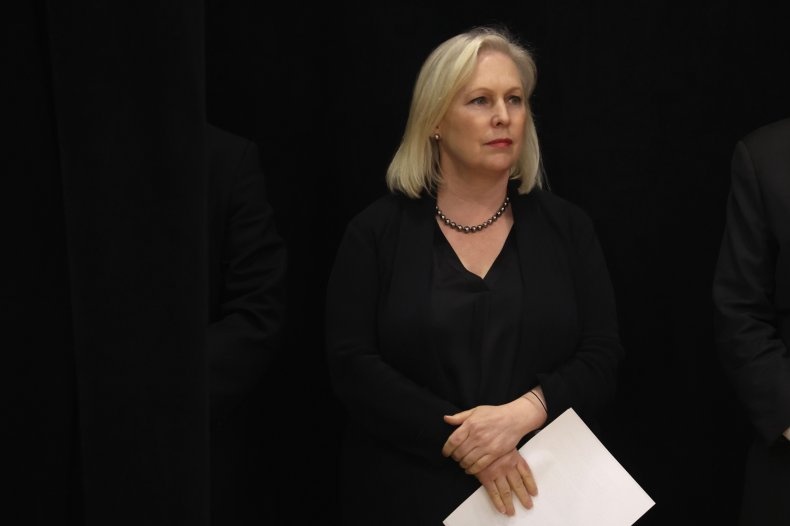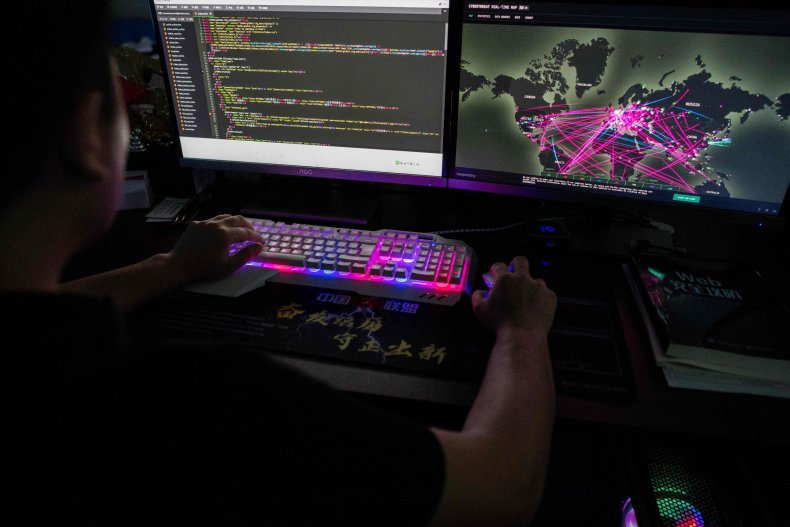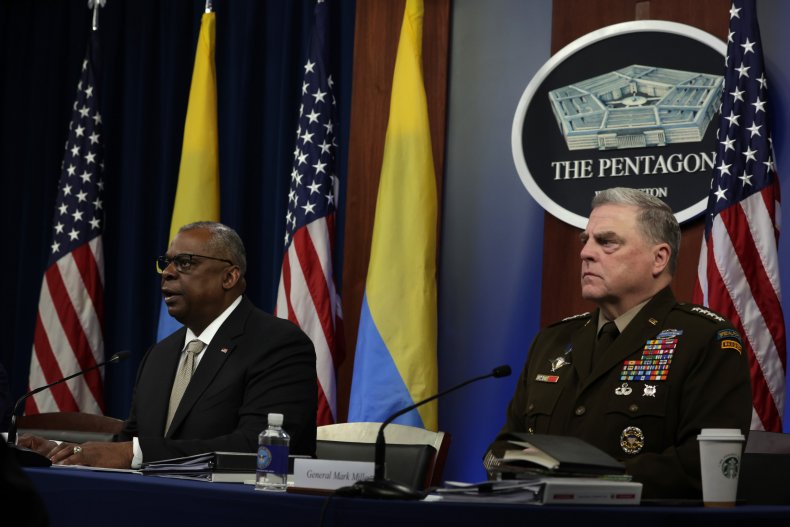ALEX J. ROUHANDEH
As America finds itself in conflict with Russia over Ukraine and at odds with China over its encroachment of Taiwan, the potential for a cyber conflict between the U.S. and its top rivals remains as great of a threat as ever.
"They feel less constrained," James Lewis, director of the Strategic Technologies Program at the Center for Strategic and International Studies (CSIS), told Newsweek. "The Chinese haven't changed their basic analysis, and Putin hasn't changed his basic analysis, which is 'the West is in decline, and we can do what we want.'"
For some time, both China and Russia have tested the U.S. in the cyber realm, Lewis notes, with the former engaging in intellectual property theft and the latter stealing and then leaking private data to fuel political divisions. He doesn't see either power letting up any time soon as each continue to bolster its capabilities.
And while Lewis notes that the U.S. has made significant cyber improvements over the past year and a half, the data collection firm Cyberseek reports that nearly 600,000 cybersecurity positions remain unfilled in a country with an aging federal workforce.
Democratic Senator Kirsten Gillibrand of New York, who sits on both the Armed Services and Intelligence Committees, has a potential solution to this problem — creating a national cyber education academy.
 Senator Kirsten Gillibrand remains focused on including her Cyber Academy proposals in the upcoming National Defense Authorization Act for 2023. In this photo she appears at the Delavan Grider Community Center on May 17, 2022 in Buffalo, New York.PHOTO BY SCOTT OLSON/GETTY IMAGES
Senator Kirsten Gillibrand remains focused on including her Cyber Academy proposals in the upcoming National Defense Authorization Act for 2023. In this photo she appears at the Delavan Grider Community Center on May 17, 2022 in Buffalo, New York.PHOTO BY SCOTT OLSON/GETTY IMAGES"The idea of creating a National Cyber Academy is that it's a call to action to America's youth to ask them to serve the United States in the cyber capacity," Gillibrand told Newsweek. "One of the biggest challenges we have in the future is protecting the nation from a cyberattack and being able to win a cyberwar should one ever start."
Modeled after the landmark G.I. Bill of the 1940s, Gillibrand's proposal aims to bolster the nation's cyber force by offering individuals the chance to earn a cyber education and graduate debt-free in exchange for five years of government service.
A key difference between her proposal and the G.I. Bill, though, is that the opportunity will extend to U.S. civilians, meaning those not interested in military service and the physical requirements associated with it will have an opportunity to serve their country and net an education without having to enlist in the armed services.
"This will be another way, like the U.S. military, to get a state-of-the-art education debt-free," Gillibrand told Newsweek. "After four years of college and five years of working in a role for the U.S. government, they will be among the most talented and well-trained individuals looking for jobs."
Russell Goemaere, a spokesperson for the Office of the Secretary of Defense, told Newsweek that the Pentagon sees the cyber workforce as a critical part of the nation's security. He said a National Cyber Academy could play an important role in attracting talent to the federal government and protecting the nation's interests.
 This photo taken on August 4, 2020 shows Prince, a member of the hacking group Red Hacker Alliance who refused to give his real name, using a website that monitors global cyberattacks on his computer at their office in Dongguan, China's southern Guangdong province. Cyberattacks originating from China stand as a national security concern.PHOTO BY NICOLAS ASFOURI/AFP VIA GETTY IMAGES
This photo taken on August 4, 2020 shows Prince, a member of the hacking group Red Hacker Alliance who refused to give his real name, using a website that monitors global cyberattacks on his computer at their office in Dongguan, China's southern Guangdong province. Cyberattacks originating from China stand as a national security concern.PHOTO BY NICOLAS ASFOURI/AFP VIA GETTY IMAGES"The United States faces persistent and increasingly sophisticated malicious cyber campaigns that threaten the public sector, the private sector, and ultimately the American people's security and privacy," Goemaere told Newsweek. "The U.S. Federal Government competes for the same limited supply of cyberspace talent as does the private sector, and oftentimes cannot compete for that talent based on higher compensation and workspace flexibilities offered by industry."
"Instead of fighting for limited resources, establishing a National Cyber Academy consisting of regional educational campuses and existing institutions of higher learning would help to alleviate this shortage by growing the cyber talent pool," he added.
Last year, Gillibrand made progress in moving the program forward by including provisions in the National Defense Authorization Act (NDAA) that required the Department of Defense (DoD) to submit a report on the feasibility of establishing such an academy.
A report due on January 1, 2023 will offer an assessment of the potential establishment of the cyber academy, provide a "talent strategy to satisfy future cyber education requirements," and also propose potential locations for a brick-and-mortar academy. A subsequent report due two years later will assess the overall workforce requirement of the DoD "for cyberspace and information warfare military personnel across the active and reserve components of the Armed Forces."
A defense official familiar with the effort told Newsweek that since the NDAA's passage the Pentagon has created an "Executive Steering Group" comprised of the department's 15 separate stakeholders responsible for overseeing its education portfolio. The official said that work on determining the "feasibility and advisability" of establishing a National Cyber Academy effort is "still is in the initial phase and additional study and coordination is ongoing."
Gillibrand hopes to push the effort further in this year's NDAA by adding additional provisions that would see the academy begin the process of attracting future students.
 U.S. Secretary of Defense Lloyd Austin (L) gives opening remarks as Chairman of the Joint Chiefs of Staff General Mark Milley (R) listens during a virtual meeting of the Ukraine Defense Contact Group at the Pentagon May 23, 2022 in Arlington, Virginia. The Pentagon's development of a cyber academy is "“still is in the initial phase and additional study and coordination is ongoing.”PHOTO BY ALEX WONG/GETTY IMAGES
U.S. Secretary of Defense Lloyd Austin (L) gives opening remarks as Chairman of the Joint Chiefs of Staff General Mark Milley (R) listens during a virtual meeting of the Ukraine Defense Contact Group at the Pentagon May 23, 2022 in Arlington, Virginia. The Pentagon's development of a cyber academy is "“still is in the initial phase and additional study and coordination is ongoing.”PHOTO BY ALEX WONG/GETTY IMAGES"While we set things in motion with last year's NDAA, it will take time to establish a brick-and-mortar academy," Gillibrand told Newsweek. "As a result, we are working to create a scholarship-to-service program that will allow us to jump-start the work of the Cyber Academy. My goal is to include this program in this year's NDAA so that students can start applying as soon as possible."
In recent years, the National Security Agency and National Science Foundation have taken steps to promote cyber education with their respective National Centers of Academic Excellence in Cybersecurity (NCAE-C) and CyberCorps: Scholarship for Service programs. Gillibrand's proposal intends to connect the federal cyber efforts. Through implementing the scholarship program, she aims to ensure that her cyber education program receives adequate resources to fill government vacancies, measure progress, and adapt the program to meet new challenges.
In the near term, Gillibrand's proposal also aims to continue progress toward expanding the cyber workforce by collaborating with existing programs. Her plan offers the same tuition for government service exchange to students who attend NCAE-C-affiliated programs at their local community colleges, colleges, and universities.
The senior defense official familiar with the program sees this component as a critical piece in addressing the problem nationwide.
"A major gap is the lack of cyber training opportunities for individuals who otherwise have no viable path into the military or into traditional colleges and universities," the defense official told Newsweek. "This often-overlooked group should be the primary targeted recruitment source for the proposed National Cyber Academy. The Cyberspace Academy would serve as the technical vocational school for candidate cyberspace professionals who upon graduation would immediately be employed across the Federal Government, thereby reducing the cyber gap."
Gillibrand believes that, once initiated, her program could very well result in the federal government admitting "a whole new class of cyber defenders every year." Additionally, she argues that the program will also help the country as a whole in the long term by playing a key role in protecting the interests of America's private sector.
Lewis of CSIS said unfilled cybersecurity positions continue to stand as a major risk to U.S. interests, as private entities operating critical infrastructure remain vulnerable to potential hacks.
The attacks on business software company SolarWinds and the Colonial Pipeline stand as two prime cyberwarfare examples. Lewis notes that both were exploited through weaknesses in their networks or "unpatched vulnerabilities." He told Newsweek that bolstering private cybersecurity workforces with people who can manage authentications and warn employees of online spam would help address some of this risk.
"If we're going to be serious about cybersecurity, we need the bodies to sort of overcome these basic errors," Lewis told Newsweek. "It's in the civilian workforce that we really have some serious shortfalls, so a civilian-focused institution would be a great idea."
"Some of the current training programs don't really give you what you need," Lewis added. "I talked to a group of [chief information security officers], and they said, 'When we get somebody out of some of these college programs, the first thing we have to do is retrain them ... That's where an institution like what Gillibrand is recommending would be helpful."
Gillibrand sees this program as a key part of preparing America for the future, one that will unfold, at least in part, in cyberspace. Like the G.I. Bill, she believes this could be a proposal that transforms the educational capacity of an entire generation.
Those educated under the G.I. Bill were able to use their newfound skills to inspire innovation within the nation's private sector. Gillibrand believes that this proposal can similarly lead to an influx of new minds into the cyberspace field, preparing the nation for a future of ever-important digital technology, where tensions with Russia and China could very well remain a significant risk.
"Because of those possible conflicts with Russia and China, we need our best and brightest defending this nation," Gillibrand told Newsweek. "We need to start building a strong workforce to meet all of those needs now, because whether you work at the Treasury or you work at the NSA, you need the best cyber capabilities possible."
No comments:
Post a Comment